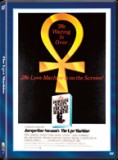| Reviews & Columns |
|
Reviews DVD TV on DVD Blu-ray 4K UHD International DVDs In Theaters Reviews by Studio Video Games Features Collector Series DVDs Easter Egg Database Interviews DVD Talk Radio Feature Articles Columns Anime Talk DVD Savant Horror DVDs The M.O.D. Squad Art House HD Talk Silent DVD
|
DVD Talk Forum |
|
|
| Resources |
|
DVD Price Search Customer Service #'s RCE Info Links |
|
Columns
|
|
|
Jacqueline Susann's The Love Machine (Columbia Classics)
"He touched you once, but now he's gone.
The pillow that his head was on, is colder than the silent dawn.
He's moving on. He's moving on.
That's Robin Stone. He's moving on."
Awfulness like this is rare--it needs to be acknowledged and celebrated. Sony, jumping into the direct mail-order business by pressing on-demand DVDs of their Columbia Pictures library catalogue (read my review of the spy caper Otley here, and the weirdo shocker The Mad Room here), has released Jacqueline Susann's The Love Machine, the 1971 big-screen expose of sex, perversion, and violence in the cutthroat world of American network television. Starring an absolutely unfathomable cast that includes Dyan Cannon, Robert Ryan, Jackie Cooper, David Hemmings, Shecky Greene (Shecky Greene???), Sharon Farrell, and John Phillip Law as cold, calculating executive and head "love machine," Robin Stone, Jacqueline Susann's The Love Machine, in the best possible way for people who love awful films, is a disaster from the get-go...and it only gets worse, thank god. Jacqueline Susann lovers have been waiting for this title for a long time, and they won't be disappointed by the pristine transfer here. No extras, though.
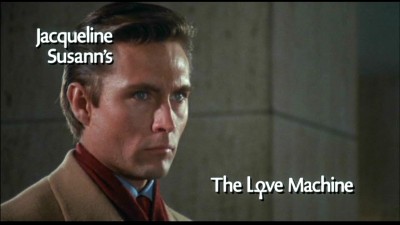
Local news anchor Robin Stone (John Phillip Law) is so far down International Broadcasting Network's pecking order, he isn't even known to the CEO and Chairman of the Board of the television network, Greg Austin (Robert Ryan). But Austin's wife, Judith (Dyan Cannon), is very much aware of the preternaturally handsome afternoon anchor, and she gives her big daddy the word about Robin. Instantly, Robin is promoted by the risk-taking Austin to network anchor and President of the news division--a move that flips out the President of IBC Programming, veteran broadcaster and executive Danton Miller (Jackie Cooper). Faced with having to work with a cocksure novice, Miller schemes to bring Stone down (especially when he hears Stone wants to produce a news show in primetime). Scrambling for a killer project, Miller latches onto a variety show starring 2nd rate comedian Christie Lane (Shecky Greene?), which proves immensely popular with audiences. Robin has problems outside of the boardroom and in the bedroom when he hooks up with Amanda (Jodi Wexler), a beautiful model who loves the cold, unfeeling Robin. A success on Lane's show as a commercial spokeswoman, Amanda can't handle Robin's wavering eye, and soon becomes Lane's girl...while the commitment-phobic Stone becomes Judith's lover. And quietly watching over all of this bed-hopping is campy photographer Jerry Nelson (David Hemmings), who befriends Amanda while harboring desires of his own for the conflicted Robin.
MAJOR SPOILERS ALERT!
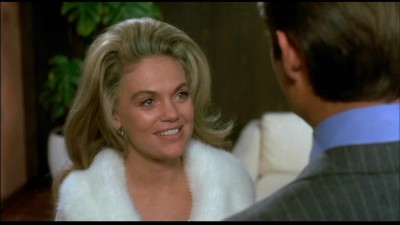
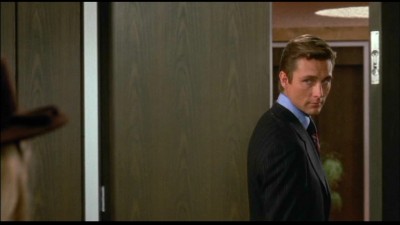
I've made it known, ad nauseam, that I consider 1967's Valley of the Dolls, based on Jacqueline Susann's all-time bestseller, one of the greatest films ever made (when they come out with a new, even more deluxe DVD edition--and they 86 that ridiculous Ted Casablanca commentary track for mine--then you'll know why). And a few months ago, I was lucky enough (well...) to review Jacqueline Susann's Once Is Not Enough. Rating Jacqueline Susann's The Love Machine alongside those two other Susann adaptations is easy: it's nowhere near as entertaining as that genuine masterpiece, Valley of the Dolls, and it miles above that genuine snoozefest, Jacqueline Susann's Once Is Not Enough--and that's good news for lovers of mind-numbingly bad movies. The Love Machine, published in 1969, didn't reach the heights of Valley of the Dolls' sales, but it did place as the third highest selling book of 1969, right behind The Godfather and Portnoy's Complaint, unloading hundreds of thousands of hardcovers in its first run alone. With sales like that, and mindful of the millions that the film version of Valley of the Dolls made (despite the general perception to the contrary, VOTD was a huge financial success), it was no surprise that The Love Machine would be quickly snatched up for filming...once Susann pocketed a cool $1.5 million for the film rights (that's 1969 dollars). With expectations high from Columbia Pictures, the movie was released in 1971; however, it famously flopped with a totally disinterested film audience.
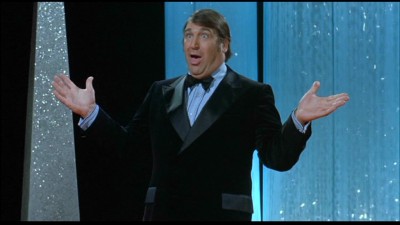
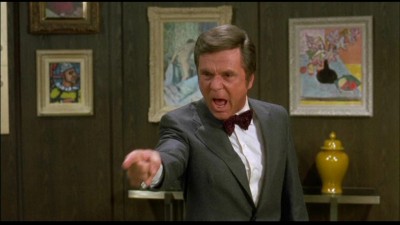
Certainly what's up on the screen here is quite different than the novel (although that doesn't necessarily indicate a direct correlation to its failure). Tamed considerably for 1971 audiences, with much of the sex and language toned down, and major characters either eliminated or drastically cut back, Jacqueline Susann's The Love Machine tries to ape some of Valley of the Dolls's conventions (super-glossy lensing, an eclectic, rather bizarre cast of familiar faces, a tasteless act every few scenes, and most recognizably, a theme song sung by none other than Dionne Warwick), but fails to create a cohesive experience out of the promising (as in "puerile") material. Love her or hate her, Susann did something right to tap into people's imagination the way she did (timing factors in heavily with her career, as well), and chief among her assets as a writer was her crude energy. Her stories move, and just as importantly, she did try and underpin her melodramatic vulgarities with a base (if suspect) psychology. The motivations of her characters may have been clichéd and simplistic, but they were basic and primal, as well, and therefore, instantly recognizable to readers.
Yet in Jacqueline Susann's The Love Machine, even that most basic psychology is often frustratingly absent. Of course we understand the scenes where Robin rejects any attempts by women to tether his sexually promiscuous habits, but what are we to make of all the insinuations about Robin's sexuality and propensity for violence? When Robin first sleeps with Amanda, he freaks out when she gets up to leave, backhanding her and forcing himself on her as he threatens, "When you sleep with me, you stay with me! You don't leave! Nobody leaves me! Nobody!" What does that violent reaction have to do with the film's main insinuations that he might be gay? We're never told outright, nor are we ever given enough information to guess. Is that why he beats up the hooker who calls him a "fag," or slaps Judith when she calls him that, too? That theory fits...or he could simply be a batterer. And yet, he rejects all advances by the bitchy-but-kindly Jerry, treating him with more tenderness than any other character except his bird (a real bird, not...well, you know). You can assume this is all sublimated, but the way these insinuations and misdirections are jumbled up in the film like mismatched puzzle pieces, you'd never know for sure, so inept is the script construction. And that's not just for Robin's motivations, but for most of the characters here. How can we believe Amanda would commit suicide over Robin, when she disappears from the center of the movie, only to inexplicably pop back up just in time to off herself? And why does Robin go ahead and cover for everyone with the police, in the film's final, hilariously-staged fight scene, taking the rap for everything that happened? Does he do it to keep his job? Perhaps...but then we don't even know his job status as the film abruptly ends as he strolls off into the night Does he do it out of friendship? Hardly. So...why? And it's not an intriguing "why," either. Just one borne out of frustration.
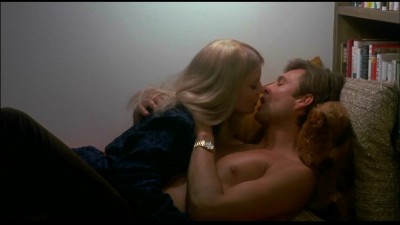
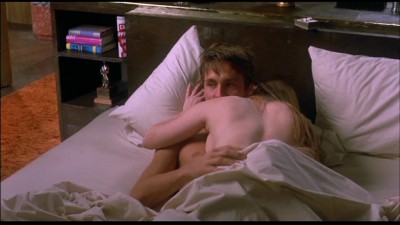
Very little connects up in this Samuel Taylor (Vertigo, Sabrina) script. We're never sure where people stand in relationship to each other. Much is made of Amanda giving Stone the ankh ring as a token of love, and an equally big scene shows Stone burying it with his dead bird, Chipper (don't ask). But we never get an acknowledgment scene where Amanda notices this crucial change. She wouldn't notice the ring gone? And what about her only-suggested relationship with Christie? She gives herself to him...why? And how did it happen that we're told, when she dies, that she was the most photographed woman in the world? Huh? How about when Stone is promoted to CEO and Chairman of the Board of ICB, through Judith's proxy when Greg almost dies of a heart attack...only to be told by Miller in the next scene that Robin's merely a consultant, and doesn't have the power to even green-light a show? Well, which one is it? He's the CEO and head cheese of the company, or he's a consultant? Much of these boardroom scenes are mildly interesting (mostly because of the good acting by Ryan and Cooper, who actually was a highly successful television executive for a time with Columbia's Screen Gems division), but only in, ironically, a kind of made-for-TV movie way. There's lots of talk about "crap" and "schlock" TV, and faux-cynical appraisals of audiences as "second rate" (which is hilarious, coming from a third-rate movie like this). But as a window into television politics, Jacqueline Susann's The Love Machine ain't Network, and worse, it's not even as coherent as The Barefoot Executive.
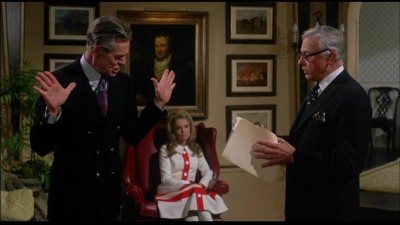
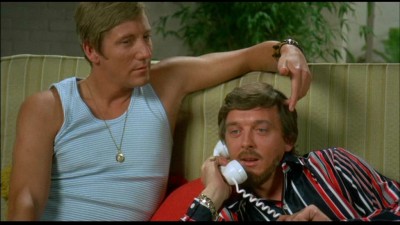
So...why, then, is Jacqueline Susann's The Love Machine worthwhile? Precisely because it is so aggressively inept. This isn't failure by default; this is almost total artistic incompetence with a vengeance. And that's what makes a "bad" film fun. Hideous lines abound here. When Amanda opens her robe for Robin, after telling him all models look like boys without their clothes on (uh oh, Robin...), she demurely asks, "Disappointed?" to which Robin leers, "Like I said: anything you haven't got, you don't need." Later, Amanda, shocked at Robin's indiscretions, plaintively states, "But I'm your girl. You're my guy!", to which Robin coolly responds, "I'm not on a leash, baby." Nonsequitors fly fast and furious (my favorite is: "You're not a nice man." "You're right--let's take a shower."), while moments like Shecky Greene asking his new squeeze prior to bedding her, "Would you like to try it out for size?", or Robert Ryan incredulously asking, "Robin Stone is AC/DC," to which Dyan Cannon flatly responds, "Balls," are moments of bad cinema to cherish.
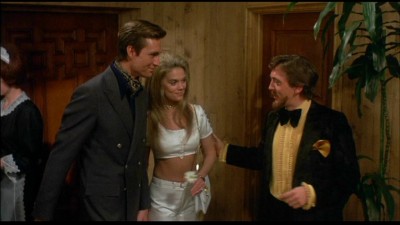
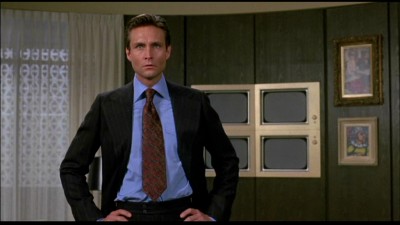
Not exactly helping matters is our lead "love machine" himself, John Phillip Law, who's truly awful here, delivering his every line like a little boy steeling up his courage to get his words out clearly for the elementary school play. He literally squares his shoulders and bravely spits them out through his clenched face, lifting his head after each one as if he's expecting a "good boy" pat on the noggin. It's a miraculously lacking performance, helping to elevate Jacqueline Susann's The Love Machine into true trash status. As for poor Shecky Greene (whom I saw in Vegas years and years ago and loved), didn't he understand that when the producers of the movie used archive footage of him performing on stage, and then had actors dismiss this "Christie Lane" footage as terrible...that they were indirectly asking the audience to believe he, Shecky Greene, was terrible, too? I suspect no performer, however, would have been safe in the hands of director Jack Haley, Jr. (Norwood, That's Entertainment!), though. Bad choices by Haley litter the project, from the hallucinatory, cringe-inducing Hallelujah Chorus drop-in when Miller survives a trip down to the boss' office (what is this movie all of the sudden: Mel Brooks?), to Amanda's fashion commercial (shades of VOTD again), where she's made to look like one of Charlie Manson's girls before she whispers, "Xanadu," into the camera (hee hee!). These are the kinds of awful moments in a film that you simply can't deliberately create. They're borne out of miscalculation and obliviousness and bad taste on a cosmic level, and without a shred of irony or facetiousness--just on that level alone--Jacqueline Susann's The Love Machine brilliantly succeeds.
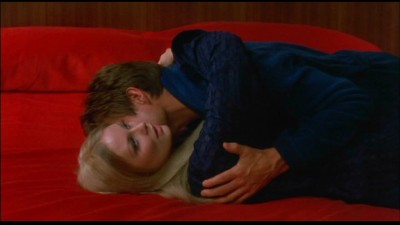
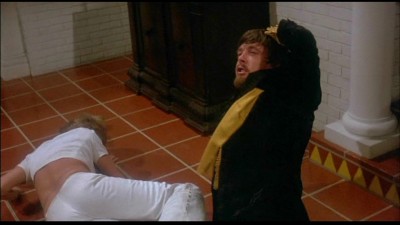
The DVD:
The Video:
Again, as with the two other Columbia Classic DVDs I've reviewed, the anamorphically enhanced, 1.85:1 widescreen transfer for Jacqueline Susann's The Love Machine is gorgeous, with solid, delicately-valued color, a razor-sharp, bright image, and no compression issues.
The Audio:
And again, the English 2.0 stereo mix is pleasingly strong, with little directionality, however, and no subtitles or close-captions.
The Extras:
Zero extras, but check out the poster artwork: "The waiting is over...".
Final Thoughts:
Miscalculation and bad taste on a colossal scale, bless their hearts. Jacqueline Susann's The Love Machine is truly one of the greats in the annals of bad cinema, giving more jaw-dropping moments of uncomprehending bliss than any 10 straight dramas. A solid buy for the right movie lover. I highly, highly recommend Jacqueline Susann's The Love Machine.
Paul Mavis is an internationally published film and television historian, a member of the Online Film Critics Society, and the author of The Espionage Filmography.


|
| Popular Reviews |
| Sponsored Links |
|
|
| Sponsored Links |
|
|
| Release List | Reviews | Shop | Newsletter | Forum | DVD Giveaways | Blu-Ray | Advertise |
|
Copyright 2024 DVDTalk.com All Rights Reserved. Legal Info, Privacy Policy, Terms of Use,
Manage Preferences,
Your Privacy Choices | |||||||









